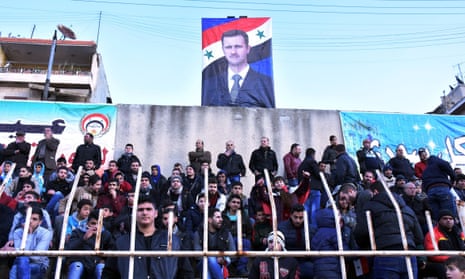Year after year, month after month, the depravity of Bashar al-Assad’s regime has been exposed more thoroughly: the systematic use of torture against opponents; the repeated deployment of barrel bombs and chemical weapons; the targeting of hospitals; the airstrike on a UN aid convoy; reports of civilians being killed on the spot as the last rebel strongholds in Aleppo fell.
Its viciousness has been capable of surprising even Syrians who thought they had endured its worst: “At each stage you reach, you discover that the previous stage was actually better, and you start worrying about the next stage,” says a former detainee of the notorious Saydnaya prison in Amnesty International’s latest report. The human rights organisation previously reported on torture and thousands of deaths at a site described by another ex-inmate as “the worst place on earth”.
Now it says that up to 13,000 of the dictator’s opponents were hanged there in secret in the first five years of the civil war. There is no reason to believe that such practices stopped when Amnesty’s informants lost access to verifiable information from the prison: it is likely that prisoners are still falling asleep to the sound of men beneath them choking to death, as one described. To call these deaths executions would imply that some kind of due process, if not justice, had occurred. The report instead describes a policy of extermination. Victims were marched from their cells and condemned to death in sham hearings, lasting just minutes and held without notice or even cursory representation, often citing “confessions” extracted by torture.
More than 4 million Syrians have left their country, fleeing a six-year war and the atrocities committed by the Assad regime and others. The report is a powerful rebuke to those who regard them as little more than an inconvenience or threat, though there should by now be no need for such reminders of wealthier nations’ moral duty to offer refuge and support to the desperate instead of barring them. Such measures are the minimum response that is required. Accountability – and justice – are also needed, however hard they may be to obtain, with the testimony from Saydnaya prison adding to the lengthy charge sheet against Mr Assad. At present there is no pathway to a trial for the Syrian president. His country never signed up to the international criminal court, and China and Russia vetoed a resolution referring Syria to the ICC. Though a separate international tribunal is possible, the obstacles are of course political.
Russia, eager to negotiate an end to the war, broke ranks with the regime at the Astana peace talks last month: but it did so to warn Mr Assad not to take it for granted and lean too far towards his other patron, Iran, which has very different goals and priorities. Turkey, previously so vociferous in demanding his departure, backpedalled as it mended relations with Russia. The outspoken but largely ineffective Obama administration has gone. Donald Trump has indicated he may cut US support to rebels; has little interest in the suffering of Syrians as long as it doesn’t drive them to seek safety in the US; and has vowed to focus on Islamic State, a stance described as “promising” by Mr Assad.
The Syrian president is not the answer to Isis; his brutality has been a very large part of the problem. The Commission for International Justice and Accountability, a private NGO partially funded by the UK, has been collecting evidence of international crimes in Syria. Its evidence – amassed at great personal risk to Syrian investigators, and including hundreds of thousands of pages of documents – is said to be the strongest “since Nuremberg”. An eventual trial of Mr Assad is a remote prospect, but it remains a necessary one on two counts. His victims at Saydnaya prison and elsewhere deserve justice; and brutal dictators of the future must be deterred.
